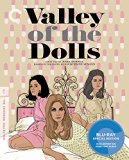| Reviews & Columns |
|
Reviews DVD TV on DVD Blu-ray 4K UHD International DVDs In Theaters Reviews by Studio Video Games Features Collector Series DVDs Easter Egg Database Interviews DVD Talk Radio Feature Articles Columns Anime Talk DVD Savant Horror DVDs The M.O.D. Squad Art House HD Talk Silent DVD
|
DVD Talk Forum |
|
|
| Resources |
|
DVD Price Search Customer Service #'s RCE Info Links |
|
Columns
|
|
|
Valley of the Dolls
Jacqueline Susann's blockbuster book becomes a boring, campy movie
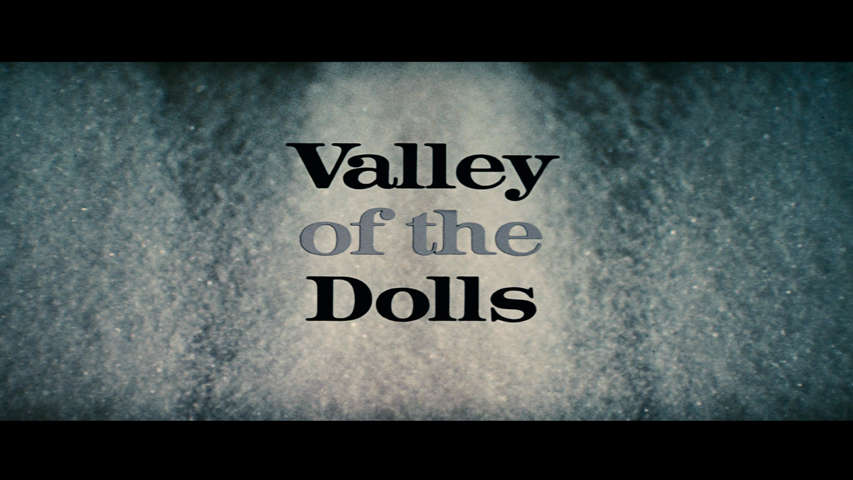
Loves: Weird movies
Likes: Patty Duke, camp, Beyond the Valley of the Dolls
Dislikes: Boring movies
Hates:
The Movie
No one who has ever watched Valley of the Dolls, Mark Robson's 1967 adaptation of Jacqueline Susann's frothy best-seller, could, with a straight face, possibly say it's a good movie. It's simply not in this realm of reality. Yes, it has its fervent fans, but they tend to be enjoying it on an ironic level or on some personal level, because the struggles of the three leads--rising star Neely (Patty Duke), pretty Jennifer (Sharon Tate) and small-town Anne (Barbara Parkins)--speak to them. But if you evaluate the film on objective cinematic merits--things like dialogue, set design and so forth--it falls far short of anything that's found a home in The Criterion Collection. So why does it bear spine number 835, enshrining it in that hallowed home-video hall of fame? Perhaps it was a package deal with its far-more-entertaining fraternal twin Beyond the Valley of the Dolls? Perhaps it's an attempt to draw some underserved niche audiences into the Collection? Perhaps someone thought it was the perfect chance to get Duke and Tate into the Criterion fold? Whatever the reason, it's happened, and now Valley of the Dolls can sit alongside Armageddon as one of the more questionable films ever to bear the famous C brand.
The story is too soapy even for soap operas. Neely is a talented Broadway performer, but her talent frightens jealous and aging star Helen Lawson (Susan Hayward), so she has her removed from her show. However, she won't be stopped, and strives toward stardom on her own path and becomes a monster in her own right. Jennifer is a beauty, but that's all anyone ever sees in her, while her mother uses her as a piggy bank and breaks her confidence at every chance. Anne is fresh from idyllic New England, and finds herself in the big city, thrown into the whirlwind that is the entertainment industry. The three will, over the course of the film, be buffeted by expectations and turn to pills (the titular "dolls") to help them through the lows, or just to, as heard in one of the film's most famous monologues, "sparkle, Neely, sparkle!"
Despite being burdened with overbearing dialogue and hugely stereotypical moments, the lead actors are actually quite engaging. (Well, at least Tate and Duke are. Parkins' WASPy Anne just sort of floats through the movie like a detached observer, for the most part.) Tate is heartbreakingly lonely as a woman valued only for her body, while Duke is magnetic as the oft-frantic Neely, except when she goes completely over the edge, including during a climactic solo scene that would be laughed off most community-theater stages. Duke's got that special something that you can't help but enjoy as she pushes herself to the brink as her character inches closer and closer to the abyss of drugs and bad decisions. If the movie focused on her and gave her an arc a bit less predictable, Dolls could certainly be a far better, but as it is, it just piles on the standard little-girl-lost melodrama.
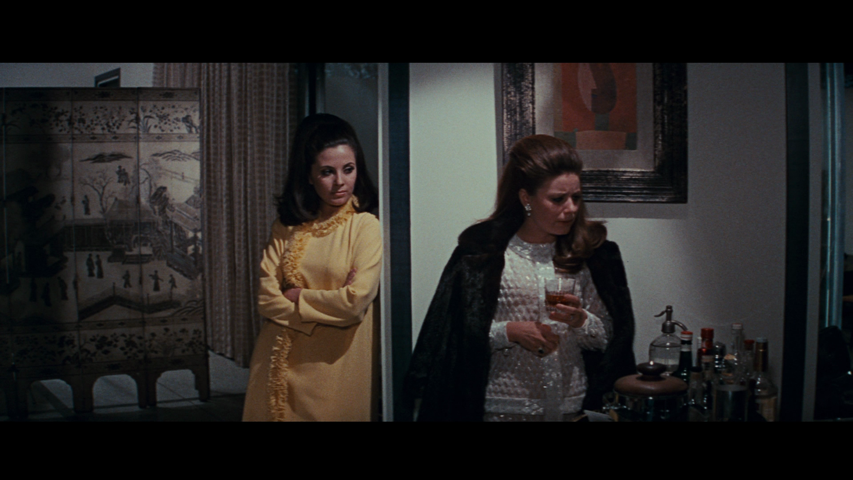
Of course, there are moments of wonder, mostly in a "I wonder why they did that?" sort of way, but there are genuinely interesting scenes as well, like some psychedelic montages involving music and fashion that crop up unexpectedly or the quality musical numbers courtesy of Andre and Dory Previn (though a dated mobile-heavy scene with Hayward is a bit odd.) The men in the movie (and the women's lives) are almost interchangeable, with little to do than get in the way of the ladies' happiness, be it through their own selfishness or their weakness. When one succumbs to a little-known illness, serving mostly to set up a big, emotional musical number, you'll be hard-pressed to find a reason to care. This isn't their movie.
Unfortunately, if you don't buy into the drama of the film, you're not going to find a How Did This Get Made? level of enjoyment anywhere in it (outside of Duke's occasional overacting (marked by shouting) and a few randomly tossed lines courtesy of Lee Grant). Nothing truly rises to a level that could be described as so-good-it's-bad. It's more of a so-dull-it's-boring. But as stated before, the film has its adoring fans, who love the fashion or the music or Neely's flip-outs. It's just unlikely they enjoy it as a cohesive film.
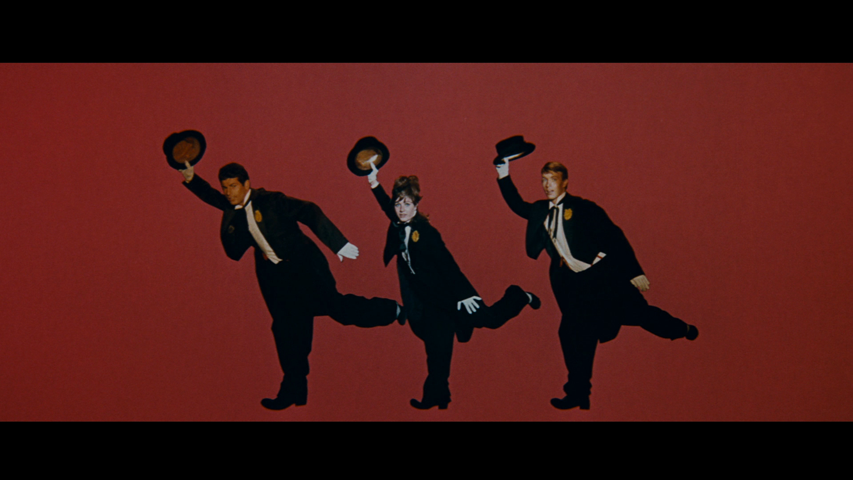
The Disc
Valley of the Dolls (spine number 835) arrives on one Blu-ray disc in a clear keepcase with a double-sided cover featuring stylish cover art by Phil Noto. The classic Criterion menu, over one of the film's period-appropriate montages, gives the choice to watch the film, navigate the timeline, select scenes and check out the special features. There are no audio options but English SDH subtitles are available.
The Quality
The 1080p, AVC-encoded 2.40:1 transfer is new, struck from a new 35mm interpositive made from the original 35mm negative, with some clean-up on the part of Criterion. Despite the limitations in color throughout much of the film, the image here is appropriate (capturing a wealth of beige) with solid color and a great deal of fine detail, spotted mainly in the various textures on display at any given time. Black levels are solid throughout, while grain is consistent. Overall, it's an impressive presentation, showing no issues with dirt, damage or digital defects.
The rare DTS-HD Master Audio 3.0 track handles all the film's aural elements without complaints, ensuring dialogue is clean and crisp, while the film's memorable music is powerful and well-defined. There's nothing particularly discreet about the mix, which uses the channels as a way to enhance the sound rather than spread it around the room.
The Extras
For the most part, the extras included on this release seem to be intended for the film's fans, rather than general cinephiles. So if you like the film, this is going to be a fantastic package for you. But unlike Criterion's Beyond the Valley of the Dolls release, they've brought less of the original Fox DVD supplements over to this disc, leaving behind the pop-up trivia track, the two featurettes ("The Divine Ms. Susann" and "The DIsh on the Dolls") and the karaoke and musical features. The commentary with Parkins and gossip columnist Ted Casablanca (who got his nom de plume from the film) does make the leap however, with its fanboy/star dynamic serving as the main engine. Casablanca excitedly prods Parkins on info about one of his favorite movies as scenes unfold, and she obliges with stories from the productions and memories of her co-stars, including talk about drugs. Wide-ranging, with plenty of gossip, it's a track the film's fanbase will certainly enjoy.
Hollywood Backstories: "Valley of the Dolls" (25:06), a Dolls-focused episode of the AMC series, digs into the story behind the making of the film, through interviews and clips, along with interviews with people involved, as well as admirers like Michael Musto and Helen Gurley Brown. Anything Casablanca couldn't get out of Parkins on the commentary comes to light here, including the story of Judy Garland's aborted involvement in the movie, censorship battles and the feud between Duke and Robson, while also looking at the movie's success and legacy. It's a compact and efficient history of the making of the film.
Criterion brought in style writer Amy Fine Collins for a pair of interviews, starting with "Once Was Never Enough" (21:49), a review of Susann's life, covering a multitude of points, including her life, her cancer, her writing, feminism, the over-prescription of medication to women of the time and Susann's view of the movie itself. In the other interview, the 7:37 "Travilla: Perfectly Poised", Collins offers background info on the Fox costume designer who designed the clothing worn in the film, and his career (including what made him different from other designers.)
A 4:53 reel of trailers features two previews that are definitely of their time, as they attempt to sell the movie in a very old-fashioned way. The archival promotional material continues with a trio of radio pieces, which run a combined 19:54. It's hard to imagine a radio show that would play such lengthy bits, which feature interviews with Parkins, Duke and several other cast members, as well as Andre Previn and producer David Weisbart. They also feature massive spoilers, which further makes one wonder where exactly these aired.
The same can be said for the three archival video programs available to watch, two of which are over 45 minutes long. It would be interesting to know if these were shot for television or some other venue, but as it is, they are curious relics. First up s "A World Premiere Voyage" (48:12), in which TV host Bill Burrad and Variety columnist Army Archerd travel aboard a cruise ship in 1967 with the cast (as well as Susann and Travilla) as they attend premieres in four different cities, with stops in Venice, Miami, Mexico and California. Interviews and clips put the focus on the film, but a general atmosphere of "This is kind of weird" couldn't be escaped.
The 1967 promo film "Jacqueline Susann and The Valley of the Dolls" (50:31) is more focused and certainly better, as it tells the author's tale, through interviews with friends and colleagues and narration from the writer herself. Susann's life is explored, as is her literary journey, which discussion of her work, her financial successes and more.
The final archival promo is quite shorter at 16:29, but "Sparkle, Patty, Sparkle!" is far more current, hailing from 2009, as Duke and Bruce Vilanch chat about the film at an anniversary celebration, discussing what it was like working with Garland and the gay devotees of the film. That more recent perspective is only briefly represented in these extras, so every bit is helpful.
A 28:06 pile of screen tests offers a rough look at early versions of several scenes by Duke, Scotti, Tate and Parkins. Not a lot changed on the way from testing to production, but the test version of Duke's classic "sparkle" line shows it received some massaging before achieving the punch of the final cut.
The final new piece of bonus content was saved for last, with "Doll Parts" a 17:11 visual essay by critic Kim Morgan, in which she defends the film (from a somewhat personal perspective), but also compares the movie to Darren Aronofsky's Requiem for a Dream (without any real stretching required) and highlights the otherwise unnoticed impact of Dory Previn on the movie.
The traditional Criterion booklet included checks in at 32 pages, with info about the movie and disc, plenty of gorgeous photography and a quality essay on the film by writer Glenn Kenny (who segues nicely at the end into the complementary essay on the other Dolls film.)
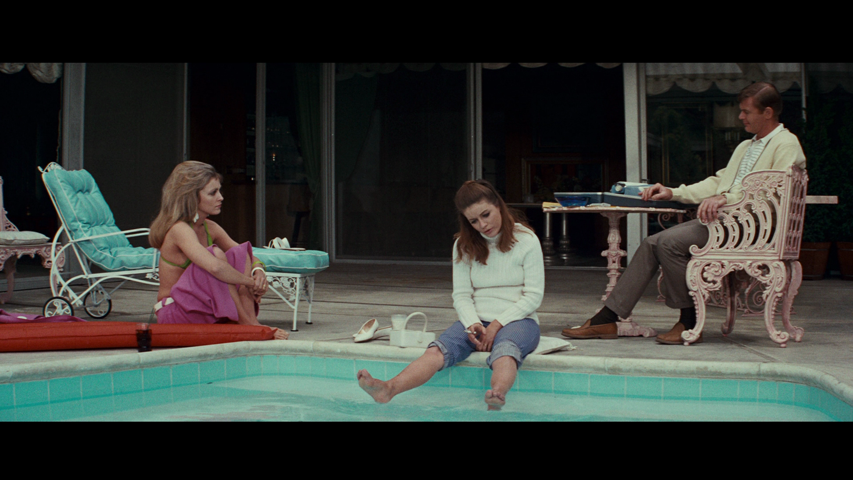
The Bottom Line
Valley of the Dolls is going to appeal to very specific audiences who see something relatable in the traumas delivered upon its trio of suffering stars, while everyone else will look quizzically at it, noticing a few interesting bits and pieces in its lengthy 123-minute runtime. Fortunately for the fans, Criterion treated it like the rest of its stable, and offers an excellent presentation, and a raft of extras that the loyal are certain to dig through. Though the film is underwhelming, the package is not, making it worth recommending to anyone who enjoys the story of Neely, Jennifer and Anne.
Francis Rizzo III is a native Long Islander, where he works in academia. In his spare time, he enjoys watching hockey, writing and spending time with his wife, daughter and puppy.Follow him on Twitter
*The Reviewer's Bias section is an attempt to help readers use the review to its best effect. By knowing where the reviewer's biases lie on the film's subject matter, one can read the review with the right mindset.
|
| Popular Reviews |
| Sponsored Links |
|
|
| Sponsored Links |
|
|
| Release List | Reviews | Shop | Newsletter | Forum | DVD Giveaways | Blu-Ray | Advertise |
|
Copyright 2024 DVDTalk.com All Rights Reserved. Legal Info, Privacy Policy, Terms of Use,
Manage Preferences,
Your Privacy Choices | |||||||









